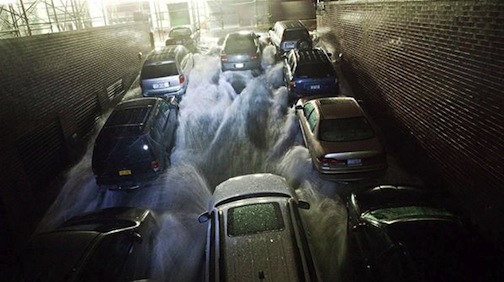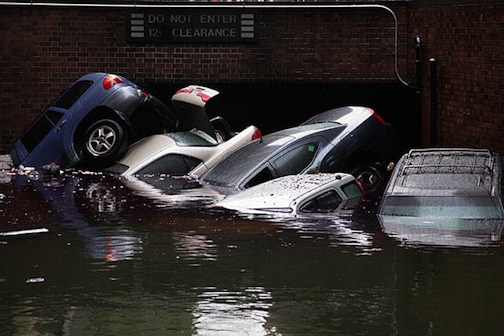How to Deal with Sandy’s Devastating, Nationwide Effects on Cars
Posted on Jun 22, 2019 in Safety | 4 comments

Water enters a parking garage in New York City
The devastation of Hurricane Sandy is hard to witness. Lost lives and destroyed property put into perspective what is important in life, but they also force us to deal with the effects and consequences of natural disasters.
After we make sure people are safe and the basic infrastructure of our cities is up and running again, we’re eventually going to have to deal with lost and damaged vehicles. A lot of them.
The issue of flooded cars has been covered here before, but after this storm the problem needs to be addressed again. We don’t know how many vehicles were lost in the massive storm, but it’s safe to say more than we can even estimate right now will be totalled out by insurance companies. Unfortunately, many of these flooded cars will be shipped across the country and re-sold. In 2005, Hurricanes Katrina, Rita and Wilma damaged over 600,000 cars. Many of those still come up for sale today.
Some states have laws specifically requiring that sellers disclose salvage, flood, fire and other damage history to prospective buyers prior to the sale. In addition, most states have laws requiring that the title be branded to show that a vehicle was previously titled as salvage, flood or rebuilt. The best way to find what your state requires is to ask your local DMV.
Be on the lookout for fraud, though. Over the next few months, used-car buyers should be especially aware of a vehicle’s history, regardless of where the car is located. A professional inspection is an imperative step in finding out if the car has ever been submerged, burned or crushed by falling trees before arriving at your dealer’s lot.

Curious about how the hurricane might affect used-car sales, I spoke with a dealer friend yesterday who said he doesn’t expect the hurricane to result in a drastic change in used-car sales this month or next. If anything, he predicts a slight uptick in national numbers as a result of people unexpectedly needing to replace vehicles. Prices could rise slightly also, depending on how many cars were taken out of inventory and now must be replaced.
If you own a car that’s been damaged by water, have your insurance company see if they can total it out and pay you for it. If not, it might still be drivable, but it’s bound to cause you problems. If you have to keep it, be prepared for some serious repairs depending on how severe the damage. Start with:
Getting the water out of the cabin. Remove and either clean or replace the seats, carpet, interior panels and possibly even the headliner. Use bleach to try to kill mold spores.
Getting the water out of the engine. Try removing the spark plugs and seeing if any water got into the cylinders. Also drain and replace the motor oil and transmission fluid.
Then start the car and begin looking for the inevitable electronic problems.
Obviously, dealing with a water-damaged car isn’t desirable. My advice: Avoid them if at all possible. If you’re stuck with one, start saving for a replacement.





check under the trunk and floor mates for mold, sometimes you can smell the mold or mildew.
Make sure any vehicle you’re considering buying has a complete, uninterrupted vehicle history and it hasn’t been moved from state to state a bunch of times. One way to “wash” the title of a flood-damaged or salvage-titled car is to register it in a state that does not recognize or require noting those things. Then when a car gets a new title, it will be clean.
Carfax has been a great help and worth every penny. Last time I looked for a car, there were a couple that had “suspicious” histories including a 25 year old jag with only 13000 miles that seemed to be titled in several states before arriving here in Michigan (originally from Florida), a sure sign of problems as Hollerin mentions. The one I bought had a solid paper trail, bought new in the state next door by the original owner here (who told me that was the closest one he could find to home) and with no retitles and solid service records. In other words, a low mileage one-owner car with solid provinance, as the guys on Antiques Roadshow always say. If anything seems suspicious, walk away. (or run if necessary)
About ten years ago a friend proudly heroes me he bought a truck off eBay. Never saw it in person.
After he had it for a few weeks he discovered flood damage. I learned two lessons from that guy: never buy a car without driving it, and always look for signs of flooding.